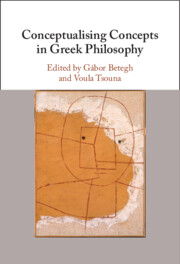Conceptualising Concepts in Greek Philosophy
Concepts are basic features of rationality. Debates surrounding them have been central to the study of philosophy in the medieval and modern periods, as well as in the analytical and Continental traditions. This is a collection of seminal philosophical studies on ancient Greek approaches to the various notions of concept, exploring the early history of conceptual theory and associated philosophical debates from the end of the archaic age to the end of antiquity. It asks when and how various notions of concept emerged and evolved in the authors from the pre-classical to the post-classical periods, what questions were raised by ancient philosophers in the Greco-Roman tradition about concepts, and what were the theoretical presuppositions that made the emergence of notions of concept possible. The volume furthers our own contemporary understanding of the nature of concepts, concept formation, and concept use. This title is part of the Flip it Open Programme and may also be available Open Access. Check our website Cambridge Core for details.
Gábor Betegh is Laurence Professor of Ancient Philosophy at the University of Cambridge, and Fellow of Christ’s College. He is the author of The Derveni Papyrus: Cosmology, Theology and Interpretation (Cambridge, 2004) and co-editor of Cicero’s De Finibus: Philosophical Approaches (with J. Annas) (Cambridge, 2015).
Voula Tsouna is Distinguished Professor of Philosophy at the University of California, Santa Barbara, President of the Society for Ancient Greek Philosophy, and member of the Scientific Committee of the Fondation Hardt. She is the author of The Epistemology of the Cyrenaic School (Cambridge, 1998), The Ethics of Philodemus (2007), and Plato’s Charmides: An Interpretative Commentary (Cambridge, 2022), and co-author of [Philodemus] [On Choices and Avoidances] (Bibliopolis, 1995), which received the Theodor Mommsen Award.

